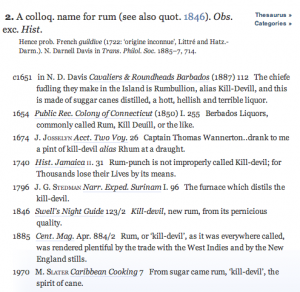So a few nights back, my mom and I went to Forbidden Island, a Tiki Lounge in Alameda, CA. I’d been there many years before with my brother and (his) wife, where this interesting picture was taken:
This time, it was me and lovely mom standing at the bar, playing Zombie Dice and drinking the most spectacularly delicious blended drink I’ve ever had, called the Banana Mamacow. I don’t care what you think about the name, just go there and drink it. It is so smooth, you’ll fall over. Go do it. I’ll wait.
This post is not about the Banana Mamacow.
This post is about a club at Forbidden Island called the Kill Devil Club. It is a club for people who love rum so much that they want to try a sip from every single bottle that the bar has to offer. (Not all in one night, but over time, like a fancy connoisseur.) Why does a whiskey-loving linguist want to talk about a rum club? She doesn’t, at least, nothing beyond the name.
If you are new to this site, you are now learning that the formation kill devil stands out to me in a big way because my recently accepted master’s dissertation is about agentive verb-noun compounds, and why they are not productive in English or German but are very productive in French and Spanish. The compound kill devil falls into this group of compounds.
When I spotted the club’s name on the menu, I panicked, recognizing the compounding pattern, but feeling unsure if I’d put it on my gigantic list of 483 agentive and instrumental verb-noun compounds. Guess what! There was no reason to panic. It is on the list.
The OED entry on kill devil lists the oldest definition as describing ‘a reckless person’, much the same as a daredevil. I used the oldest usage to catalogue the compound in my dissertation, hence the panic. The second oldest usage takes us to alcohol and rum:
(Sidenote: rum is short for rumbullion?!?!)
Though I was not confident I’d known this word before Forbidden Island, the components and the subject fit nicely into the English pattern of agentive verb-noun compounds like cutthroat, spitfire, scarecrow, pickpocket, and turncoat. Why? Here’s a list to tell you why.
1. The subject. Alcohol. Of the many topics that English agentive and instrumental verb-noun compounds are good at describing, alcohol is a large category. Rotgut is the most commonly heard example in modern speech, but tanglelegs, kill-priest, stitchback, huffcap, ticklebrain, pinchgut, and tear-brain also refer to strong or sour types of ale, wine, and liquor. In general, this form excels at describing people and things in a comically negative manner, and kill devil fits right in.
2. The verb. Kill. Kill is the 4th most common verb I found in this type of English compounding. Other common verbs, from most to least productive are: break, turn, lack, pick, catch, lick, and make.
3. The noun. Devil. Of the many nouns used in these compounds, devil, penny, and water show up often, in compounds like scare-devil (the hypericum plant) and pull-devil (a cluster of fish hooks).
In conclusion: If you take me to a tiki bar, I will drink a joyous amount of alcohol in my tummy, and I will find a way to turn the conversation to historical linguistics.
January 7, 2013

